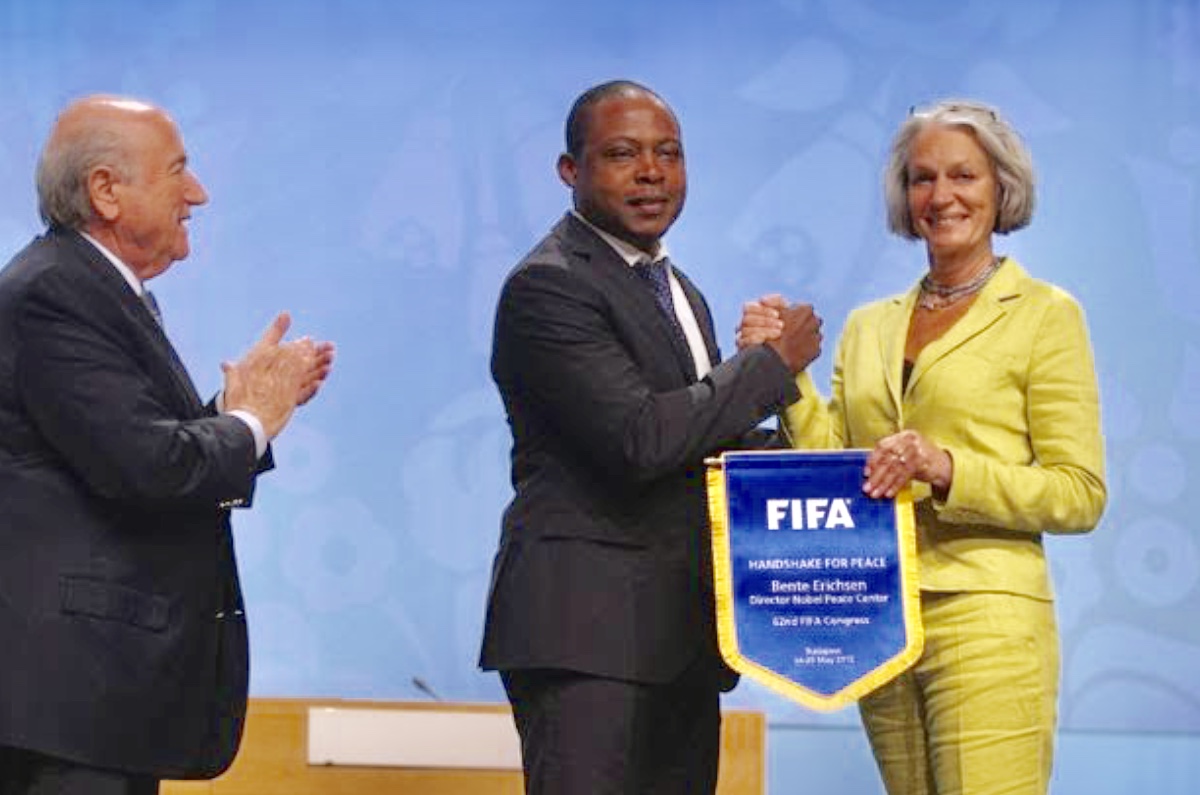When it comes to crisis and dysfunction, none other than Gianni Infantino has mastered the art of fuelling it so as to gain by way of imposing pliable candidates and holding hapless Governments hostage. Clearly Gianni Infantino is more interested in interaction with heads of state than being in the actual football industry itself.
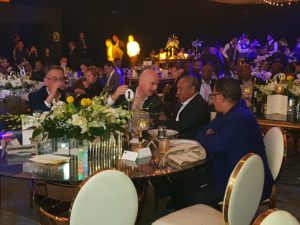
After the purge which took place in Cairo right after the CAF General Assembly, Gianni Infantino had time to wine and dine after a job well done.
From Mali, to Sierra Leone, to Madagascar, to Ghana, to Zambia there seems to be a general trend of cosmetic leadership crisis, staged by Zurich so as to illegally extend the mandates of administrators of questionable character or who are more than willing to comply with every delusional agenda that FIFA wish to concoct.
This rudimentary approach is what has spun the Confederation of African Football (CAF) into one huge mess, creating the opportunity for Gianni Infantino to manifest and impose his colonialistic agenda.
At the heart of the current football impasse in Africa is the superiority complex and profound sense of entitlement with the Swiss-Italian Infantino, who views Africans as mere subjects and not partners for progress. Which explains the indifference to criticism or divergence of opinion because in his mind, Africans are incapable of anything and must rely on the white man for any form of progress.
Take for example the pooling of TV Rights for the WorldCup 2022 Qualifiers. Member Associations were not provided with the opportunity to offer any form of input, despite the gloating and posturing by Infantino’s off-shoots, hailing it as a major success. This “Jesus Complex” white-man racist and condescending attitude has roots from his home country Italy, where Romelo Lukaku and a host of players continue facing racist bullying.
The haste at which he moved to ban CAF ExCo member Musa Hassan Bility purely because of questioning a very ill conceived partnership, further indicates Infantino’s allergy to independent minds within the leadership of African football. Imposing as many puppets as possible seems to be top on his agenda for African football because he can easily manipulate them to toe his line.
Today we focus on one case study which is the Zambia FA and a suspicious lifting of sanctions by the FIFA Adjudicatory Chamber. Both Kalusha Bwalya and former UEFA President Michel Platini were banned under identical circumstances, but somehow Bwalya’s appeal was successful while Platini’s was not.
We try to extrapolate how the Ethics Chamber is used by Gianni Infantino to settle scores and elevate loyalists, who he can in-turn use for his own personal gratification.
In August 2018, the Adjudicatory chamber of the FIFA Ethics committee handed former Zambian FA President Kalusha Bwalya a 2-year ban from all footballing activity.
The ban was in relation to the well-documented bribery scandal of African FA Presidents in 2008 – 2009, fomented by Mohammed Bin Hamman the then powerful Asian Confederation President and FIFA Vice-President who also had aspirations to the FIFA Presidency.
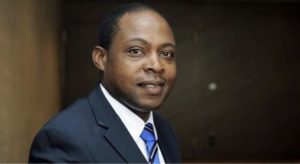
Celebrated Zambian former footballer but disgraced football official Kalusha Bwalya.
“The adjudicatory chamber found Mr Bwalya guilty of having violated art. 16 (Confidentiality) and art. 20 (Offering and accepting gifts and other benefits) of the FIFA Code of Ethics,” read the statement.
“A fine in the amount of CHF 100,000 was also imposed on Mr Bwalya.
In Zambia, news of Bwalya’s ban by FIFA was received with shock and disbelief in many quarters, considering that he was arguably the country’s sole bonafide footballing icon.
Over a span of two-and-a-half decades, Bwalya had built himself an enviable footballing profile in Africa and the World, that would be hard to match in a generation.
Having earned 87 caps for the Chipolopolo (copper bullets, nickname for the Zambian National football team) Bwalya was certainly high profile enough in the football-mad country. Couple this with his performances for PSV Eindhoven, Cercle Brugge and Mexico’s America during his playing career and the 1988 nomination for African Footballer of the Year award capped it perfectly.
Back at home, he is remembered for the hat-trick he scored during the 1988 Olympics games in Seoul, Korea in the famous 4-0 defeat of Italy.
Kalusha was however not on the ill-fated flight that crashed with the entire Zambian National team off Gabon in 1993, as he was expected to link up with the team in Senegal, directly from Netherlands where he played his pro-football at the time.
He would follow his on-field exploits with the managerial position for the National team 2003 – 2006.
He later served 2 consecutive terms as the President of the Football Association of Zambia (FAZ) FROM 2008 – 2016 when he was succeeded by Andrew Kamanga at the polls that year.
Kalusha also served as a member of the CAF Executive Committee (Exco) since 2008, a position he wished to continue serving in, had he been re-elected in 2019.
It is therefore easy to appreciate the confusion wrought upon the Zambian sports media by the decision of the FIFA Ethics committee to ban Kalusha for a 2-year period.
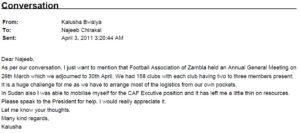
Part of the tranche of documents and emails that FIFA relied on to ban Kalusha Bwalya.
As happens in many African setups, many would have wanted FIFA to sweep the clear breaches of the code of ethics under the carpet, pretend never to have seen them, and allowed Kalusha on his merry way.
However, the football governors thought very differently of the issue as demonstrated by the vote in 2016, where Kalusha was defeated by rank outsider Andrew Kamanga by a slim margin in what pundits had predicted would be an complete rout.
So why did Zambian football Governors pass this vote of no-confidence in Kalusha Bwalya, a man who had scaled the heights of National, continental and global football?
In the run-up to this year’s CAF Exco elections where a half of the seats fell vacant, Andrew Kamanga expressed his desire to represent the COSAFA region on the Exco, replacing Kalusha who had been banned by FIFA Ethics committee until August 2020 and thus would be unable to contest.
Kamanga even went the extra mile to seek the approval of the Governors of FAZ and his colleagues in COSAFA to contest the seat.
Then something very strange happened in January 2019.
The Appeals committee of the FIFA Ethics committee reviewed the case after Bwalya appealed the decision, and “partially upheld” the decision of the Adjudicatory chamber.
The direct implication of this decision was that the 2-year ban from all footballing activity was reduced to time already served (5-months) and the CHF 100,000 fine reduced to CHF 10,000 immediately.
And just like that, Kalusha Bwalya, a man who had been proven to have received bribes and other gifts from Mohammed Bin Hamman had become cleansed by the system, and was now eligible to vie for any seat in CAF or FIFA.
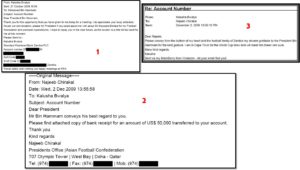
The same tranche of emails which were used to hand lifetime bans on Qatari officials Mohammed Bin Hamam and Najeeb Chirakal, have now been used to exonerate and commute Kalusha Bwalya’s “ban”. This must be a legal precedent in any constitutional dispensation.
FIFA Ethics committee and its appeals body continue to be used both as a shield and a spear by FIFA President Infantino. In this case, with the myriad problems facing African football and the growing unrest about the child-like mismanagement of CAF affairs by its President Ahmad Ahmad, Kalusha in his characteristic see no evil, hear no evil and speak no evil style was considered a safe pair of hands to have on the CAF Exco.
Ahmad would therefore impress upon Infantino the need to unencumber Bwalya off of his ban by getting the appeals body to unilaterally and outside the bounds of logic, to clear him.
Conversely, didn’t we see similar mis-use of the Court of Arbitration for Sports (CAS) by Infantino when former UEFA President Michel Platini ban has been reduced systematically?From the initial 8-year ban down to a 6-year ban before CAS elected to reduce the ban further to 4 years, just long enough to ensure that he would be ineligible to contest against Infantino at the 2019 FIFA Presidential elections.
Back in Zambia, Kalusha set about to disrupting things to ensure that he would be on the ballot for the CAF Exco elections.
He has learnt over the years to use his status as a football icon to rally various quarters to his side.
No one has bought into the Kalusha Bwalya show harder than the current Sports Minister Emmanuel Mulenga. Like a deer caught up in the headlights of car in the dark, he appears unable to move past the old glory of Kalusha Bwalya.
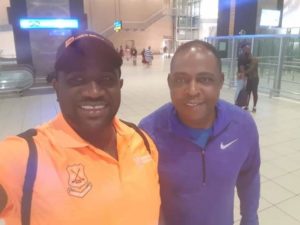
Kalusha Bwalya photographed here with the current Zambian sports minister Emmanuel Mulenga. Mulenga has downgraded himself from neutral arbiter to a partisan activist.
Kalusha actually made it a National issue that Andrew Kamanga should set aside his own ambitions for a seat on the CAF Exco, and instead endorse him to it. Aside from the fact that it was his ban by FIFA that had spurred Kamanga into action, the reversal of the 2-year ban was expected to have a similar effect across board.
Former Sports Minister Moses Mawere had initially attempted to broker a compromise that would have had FAZ forward the name of Kalusha Bwalya as the sole nominee for the position on the Exco.
Kalusha had quietly managed to convince the Minster and the wider Zambian media fraternity that CAF President Ahmad Ahmad had promised to nominate him to the CAF Vice-Presidency when it became clear quite early on that the position of its holder, Nigeria FA President Amaju Pinnick, was no longer tenable.
The then Minister considered the possibility of a Zambian CAF Vice-Presidency to be a matter of National pride, which made him even more belligerent towards FAZ for its refusal to play ball.
Information had already leaked, as early as February 2019 that CAF President Ahmad already knew whom he wanted to be the CAF ExCo designate for the COSAFA region. His choice all along was never going to be Kalusha Bwalya, who brought with him too many ghosts of the bribery by Bin Hamman, breaches of the FIFA Ethics code that Ahmad himself had yet to answer to.
The very same documents used by the FIFA Ethics committee to sanction Kalusha are the very same ones that show clearly, President Ahmad receiving the exact same gifts and bribes from Bin Hamman, when Ahmad was a lowly FA President for Madagascar.
Ahmad’s choice for CAF ExCo for the COSAFA region was the President of the Mauritius FA, the colourless Samir Sobha, who as was widely expected, carried the vote on the day.
Ahmad and Samir have a long history as business partners, case in point the very nasty business of selling off fishing concessions of their island Nations to the greedy Chinese, in cahoots with then UNDP boss for Madagascar (and now FIFA Delegate for Africa and FIFA SG) Fatma Samoura.
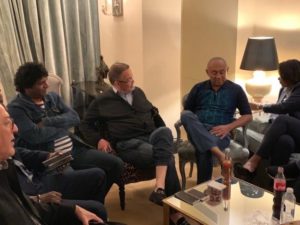
Upon his release from detention in Paris on 7th June, Ahmad was consoled by his closest and fiercest allies. One of them was Samir Sobha (pictured with the striped shirt). Somehow Kalusha Bwalya was naive enough to believe that he shared closer ties with the Ahmad.
It can therefore be argued that the level of stupidity on the CAF ExCo has grown exponentially since the arrival of Ahmad to its Presidency in early 2017.
Why then would Bwalya lie to successive Sports Ministers that he was the CAF VP designate when he knew clearly that he wasn’t anywhere on the radar? Didn’t Bwalya get drafted into the campaign secretariat for Samir Sobha, days to the penultimate vote in a last minute rally to undermine Kamanga?
Back home, Kamanga was also trying to find his way around the reality of a cabinet reshuffle that had brought Minister Emmanuel Mulenga to the Sports Ministry while grappling with reduced funding for the National team due to austerity measures instituted by Government.
It started being evident early in the deliberations between Sports Ministry and FAZ that Kalusha was suddenly interested in the position of National team Head Coach, moreso when it was affirmed that a consolidated budget of $25,000 had been agreed to pay the coach (FAZ $15,000 and GoZ $10,000 per month).
The Sports Ministry attempted to insert Bwalya into the National team conversation in a round-about manner, suggesting that he become involved in the identification of a National team coach or (and here is the real kicker) that he take over the coaching responsibilities of the National team!
Whenever FAZ explained to the Minister just how inappropriate these suggestions really were, the issue of perceived differences between Bwalya and Kamanga kept being conjured up and thrown into the ring over and over.
During the CAF General Assembly in Egypt on 18th July 2019, and in the face of a financial report read out by Finance Committee Chairman Fouzi Lekjaa, only Andrew Kamanga stood to question the accounts.
Rightly so too, because he is a chartered accountant of no mean repute and the way the books of CAF have been handled by Ahmad, have left too many questions in the minds of right thinking people.
For instance, how could Lekjaa casually comment to delegates that CAF had moved from a surplus situation two years previously, to a deficit exceeding $6 million despite a spike in the injection of new commercial partners at CAF?
Ahmad, known for being a highly vindictive individual and being viewed as the cleverest person in the room would obviously feel uncomfortable with Kamanga, and just as was witnessed with Zimbabwe ex-FA President Dr. Phillip Chiyangwa after he had served his purpose, it appears that Ahmad would now use Bwalya to destabilize Kamanga at home, in the hope that Bwalya would graciously re-ascend his previous FA Presidency, and revert to default settings of a studious silence, masked as intelligence.

